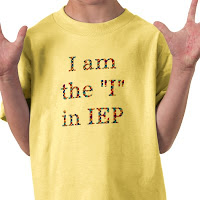“I think my child is on the autism spectrum. I would like to know some traits to help clarify what high functioning autism is and how I can recognize it.”
Here are the main characteristics of children with High-Functioning Autism (HFA):
The Need for Routine—
 Perservation is a common characteristic of the youngster with HFA. Perservation involves repetition in language and/or behavior. For example, with language a perservative tendency is to repeat certain phrases over and over.
Perservation is a common characteristic of the youngster with HFA. Perservation involves repetition in language and/or behavior. For example, with language a perservative tendency is to repeat certain phrases over and over.
Here are the main characteristics of children with High-Functioning Autism (HFA):
The Need for Routine—
 Perservation is a common characteristic of the youngster with HFA. Perservation involves repetition in language and/or behavior. For example, with language a perservative tendency is to repeat certain phrases over and over.
Perservation is a common characteristic of the youngster with HFA. Perservation involves repetition in language and/or behavior. For example, with language a perservative tendency is to repeat certain phrases over and over. In terms of action or behavior, the Asperger youngster may line objects up and insist the objects not be disturbed. Completing a certain set of rituals in a specific order also demonstrates perservation.
Sensory Sensitivity—
The youngster with HFA may be underactive to a sensation, or s/he may be intensely reactive to a sensation. The sensitivity could involve one or involve many of the senses. For example, before my son was diagnosed, as a parent I was appalled when he wanted to run outside in the middle of winter with no shoes or boots. I was so afraid he would sneak out of the house and get severe frostbite.
Sensory Sensitivity—
The youngster with HFA may be underactive to a sensation, or s/he may be intensely reactive to a sensation. The sensitivity could involve one or involve many of the senses. For example, before my son was diagnosed, as a parent I was appalled when he wanted to run outside in the middle of winter with no shoes or boots. I was so afraid he would sneak out of the house and get severe frostbite.
I also remember he was fascinated by lights. Some moms and dads of Asperger kids detail how their youngster may scream when the vacuum is turned on or how their youngster refuses to brush their teeth due to the sensation caused by the tooth brush.
==> How to Prevent Meltdowns and Tantrums in Children with Autism Spectrum Disorder
Motor Clumsiness—
Sometimes, but not always, kids with HFA display poor coordination because they experience difficulties with either or both fine and gross motor skills. This problem is due to difficulties with motor planning in completing the task. For example, the youngster may experience difficulty in riding a bike because of planning the different steps to successfully complete the task.
Difficulty with Social Interaction—
Although the HFA youngster may want to interact with others, s/he lacks the skills. The Asperger youngster fails to understand both verbal and nonverbal cues, and communication with others breaks down. The Asperger youngster may lecture others, fail to ask questions to continue a discussion, or simply not even acknowledge the other person by looking at them.
Motor Clumsiness—
Sometimes, but not always, kids with HFA display poor coordination because they experience difficulties with either or both fine and gross motor skills. This problem is due to difficulties with motor planning in completing the task. For example, the youngster may experience difficulty in riding a bike because of planning the different steps to successfully complete the task.
Difficulty with Social Interaction—
Although the HFA youngster may want to interact with others, s/he lacks the skills. The Asperger youngster fails to understand both verbal and nonverbal cues, and communication with others breaks down. The Asperger youngster may lecture others, fail to ask questions to continue a discussion, or simply not even acknowledge the other person by looking at them.
The desire to communicate may be there, but the language abilities others seem to develop naturally just don't develop easily for the HFA youngster. But HFA kids develop these skills with early interventions and teaching.
Development of a Narrow Range of Interests—
If a youngster seems stuck on a certain topic and seems a bit obsessed about always talking about that topic, s/he demonstrates narrow interests -- this a characteristic of HFA. Often the youngster learns everything s/he can about this special interest and then feels compelled to share information about the topic with everybody around them. Usually focusing on narrow interests affects social interactions negatively.
Delayed or Impaired Language Skills—
If your youngster starts talking late and exhibits lagging language skills, this may be a sign of HFA. My son, who has HFA, talked late, but when he did, he began with full phrases and sentences. He also mixed up pronouns.
Development of a Narrow Range of Interests—
If a youngster seems stuck on a certain topic and seems a bit obsessed about always talking about that topic, s/he demonstrates narrow interests -- this a characteristic of HFA. Often the youngster learns everything s/he can about this special interest and then feels compelled to share information about the topic with everybody around them. Usually focusing on narrow interests affects social interactions negatively.
Delayed or Impaired Language Skills—
If your youngster starts talking late and exhibits lagging language skills, this may be a sign of HFA. My son, who has HFA, talked late, but when he did, he began with full phrases and sentences. He also mixed up pronouns.
The HFA youngster also fails to understand the "give and take" of communication; in other words, the youngster may want to monopolize a conversation and fail to acknowledge the comments of others. The youngster with HFA understands communication as a way to share information but fails to recognize communication as a way to share thoughts, feelings and emotions.
Cognitive Difficulties—
Frequently the HFA youngster experiences difficulty with empathizing with others and says inappropriate things because the youngster fails to consider others' feelings. A significant problem for the HFA youngster, mindblindness occurs when the Asperger youngster is unable to make inferences about what others are thinking. Mindblindness hinders communication with others.
Although some of these traits are common to other disabilities, the whole bunch together certainly suggests further investigation into an HFA diagnosis. A professional, like a psychologist or a psychiatrist, should be consulted because early intervention is very important.
Cognitive Difficulties—
Frequently the HFA youngster experiences difficulty with empathizing with others and says inappropriate things because the youngster fails to consider others' feelings. A significant problem for the HFA youngster, mindblindness occurs when the Asperger youngster is unable to make inferences about what others are thinking. Mindblindness hinders communication with others.
Although some of these traits are common to other disabilities, the whole bunch together certainly suggests further investigation into an HFA diagnosis. A professional, like a psychologist or a psychiatrist, should be consulted because early intervention is very important.
More resources for parents of children and teens on the autism spectrum:
==> How to Prevent Meltdowns and Tantrums in Children with Autism Spectrum Disorder
==> Parenting System that Reduces Defiant Behavior in Teens with Autism Spectrum Disorder
==> Launching Adult Children with Autism Spectrum Disorder: Guide for Parents Who Want to Promote Self-Reliance
==> Teaching Social-Skills and Emotion-Management to Children with Autism Spectrum Disorder
==> Parenting Children and Teens with High-Functioning Autism: Parents' Comprehensive Handbook
==> Unraveling the Mystery Behind High-Functioning Autism: Audio Book
==> Crucial Research-Based Parenting Strategies for Children and Teens with High-Functioning Autism
==> Parenting System that Reduces Defiant Behavior in Teens with Autism Spectrum Disorder
==> Launching Adult Children with Autism Spectrum Disorder: Guide for Parents Who Want to Promote Self-Reliance
==> Teaching Social-Skills and Emotion-Management to Children with Autism Spectrum Disorder
==> Parenting Children and Teens with High-Functioning Autism: Parents' Comprehensive Handbook
==> Unraveling the Mystery Behind High-Functioning Autism: Audio Book
==> Crucial Research-Based Parenting Strategies for Children and Teens with High-Functioning Autism



.jpg)


